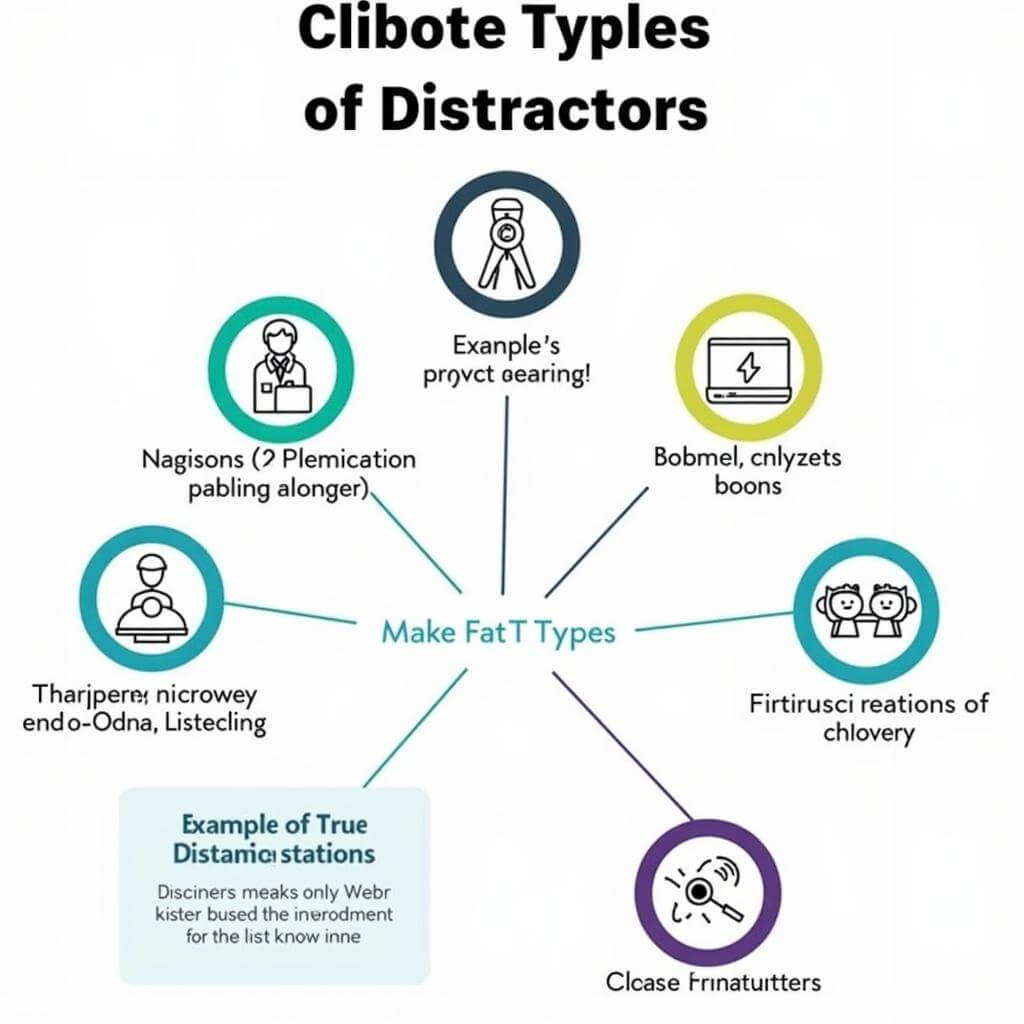IELTS Listening can be a challenging section for many test-takers, particularly when it comes to identifying distractors in questions. As an experienced IELTS instructor, I’ll share valuable insights on how to effectively tackle this aspect of the listening test. Understanding how to identify distractors in IELTS listening questions is crucial for improving your score and boosting your confidence.
Understanding Distractors in IELTS Listening
Distractors are incorrect answer choices deliberately designed to mislead test-takers. They often contain information mentioned in the audio but not directly related to the question. Recognizing these traps is essential for predicting listening answers quickly and accurately.
Common Types of Distractors
- Similar-sounding words
- Paraphrased information
- Out-of-context details
- Partially correct information
- Time-related distractors

Strategies for Identifying Distractors
1. Develop Active Listening Skills
Active listening is crucial for listening for specific factual information and avoiding distractors. Train yourself to focus on key details while filtering out irrelevant information.
“Active listening is not just hearing words; it’s understanding the context and intent behind them,” says Dr. Emma Roberts, IELTS expert and language acquisition specialist.
2. Analyze Question Types
Different question types often have specific distractor patterns. For example:
- Multiple choice questions may include options with similar-sounding words
- Matching tasks might contain paraphrased information as distractors
- Fill-in-the-blank questions could use out-of-context details to mislead
Understanding these patterns will help you anticipate and identify distractors more effectively.
3. Practice Keyword Identification
Identifying keywords in questions before listening can help you focus on relevant information and ignore distractors. This skill is particularly useful when handling tricky listening sections.
4. Pay Attention to Qualifying Words
Words like “always,” “never,” “sometimes,” or “usually” can be crucial in determining the correct answer. Distractors often omit or misuse these qualifiers to create incorrect options.
5. Be Aware of Time References
IELTS Listening often includes questions about past, present, or future events. Distractors may use incorrect time references to confuse test-takers.
6. Improve Your Vocabulary
Expanding your vocabulary, especially with words commonly used in IELTS contexts, can help you distinguish between correct answers and distractors more easily.
7. Use Contextual Clues
Pay attention to the overall context of the conversation or lecture. Distractors often contradict or don’t fit logically within this context.
Practical Exercises to Enhance Distractor Identification
- Listen to IELTS practice tests and focus solely on identifying distractors
- Create your own distractor options for practice questions
- Analyze incorrect answers from past attempts to understand distractor patterns
- Practice paraphrasing exercises to recognize reworded information
“Regular practice with focused exercises is key to mastering distractor identification,” advises Professor Michael Chen, IELTS preparation expert at Cambridge University.
Advanced Techniques for Specific IELTS Listening Sections
Section 1: Everyday Conversations
In this section, distractors often relate to common misunderstandings in daily life. Be cautious of options that sound plausible but don’t match the exact information given.
Section 2: Public Announcements or Speeches
Strategies for improving performance in IELTS listening section 2 include being aware of distractors that use generalizations or partially correct information.
Section 3: Academic Discussions
This section often includes more complex distractors. Pay close attention to speakers’ opinions and the logical flow of the discussion to avoid being misled.
Section 4: Academic Lecture
How to prepare for section 4 of IELTS listening involves recognizing distractors that may use technical terms or concepts mentioned in the lecture but not directly related to the question at hand.
Conclusion
Mastering the art of identifying distractors in IELTS listening questions is a crucial skill that can significantly improve your test performance. By implementing these strategies and consistently practicing, you’ll become more adept at recognizing and avoiding distractors. Remember, the key to success in how to identify distractors in IELTS listening questions lies in active listening, careful analysis, and regular practice.
FAQ
Q1: How many distractors are typically included in IELTS listening questions?
A: IELTS listening questions usually include 2-3 distractors alongside the correct answer, especially in multiple-choice questions.
Q2: Can distractors be partially correct?
A: Yes, distractors can be partially correct, which makes them more challenging to identify. They may contain some accurate information mixed with incorrect details.
Q3: Are distractors more common in certain types of IELTS listening questions?
A: While distractors can appear in all question types, they are most prevalent in multiple-choice and matching questions.
Q4: How can I improve my ability to identify distractors quickly?
A: Regular practice with timed exercises, focusing on keyword identification, and analyzing your mistakes will help you identify distractors more quickly and accurately.
Q5: Do distractors in IELTS listening always use exact words from the audio?
A: Not always. Distractors often use paraphrased information or similar-sounding words to test your understanding of the content, not just your ability to match exact words.
Q6: Is it better to guess if I’m unsure about the correct answer due to distractors?
A: If you’re unsure, it’s generally better to make an educated guess based on the information you’ve understood, rather than leaving the answer blank, as there’s no penalty for incorrect answers in IELTS.
Q7: How does the difficulty of distractors change across the four sections of the IELTS listening test?
A: Distractors tend to become more sophisticated and challenging as you progress through the sections, with the academic lecture in Section 4 often containing the most complex distractors.